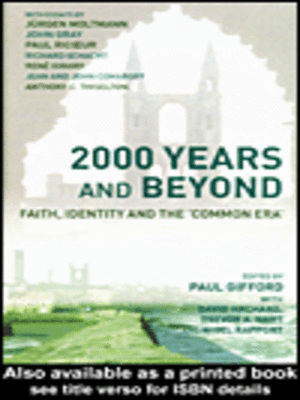
Sign up to save your library
With an OverDrive account, you can save your favorite libraries for at-a-glance information about availability. Find out more about OverDrive accounts.
Find this title in Libby, the library reading app by OverDrive.



Search for a digital library with this title
Title found at these libraries:
| Loading... |
2000 Years and Beyond brings together some of the most eminent thinkers of our time - specialists in philosophy, theology, anthropology and culture theory to ask the strategic question surrounding the millennium that others never thought to raise, or asked more partially. In a horizon-scanning work, they look backwards and forwards to explore what links us to the matrix of the Judaeo-Christian tradition from which Western cultural identity has evolved.
Their plurral reflections raise searching questions about how we move from past to future - and about who 'we' are. What do the catastrophes of the twentieth century signify for hopes of progress? Can post - Enlightment humanism and its notion of human nature survive without faith? If the 'numinous magic global capitalism' is our own giant shadow cast abroad, does that shadow offer hope enough of a communal future? What other sources and resources do we have for inventing one?
Most crucially: has the modern, secularized West now outgrown its originating faith matrix? What perspectives of understanding - reflexivity multiculturalism, the historicity of knowledge, globalisation - go into the making of the modern mind? Can we define its mindset and temper? Are we truely and finally 'post-Christian' - or, more ambiguously, just post-millennial and suffering hangover?
Often controversial and sometimes visionary, these seven new essays ask: how do we tell - and rewrite - the story of the Common Era? Introduced by Paul Gifford, and discussed in a lively dialogic conclusion, they add their distinctive voices to a debate of profound and urgent topicality.
Their plurral reflections raise searching questions about how we move from past to future - and about who 'we' are. What do the catastrophes of the twentieth century signify for hopes of progress? Can post - Enlightment humanism and its notion of human nature survive without faith? If the 'numinous magic global capitalism' is our own giant shadow cast abroad, does that shadow offer hope enough of a communal future? What other sources and resources do we have for inventing one?
Most crucially: has the modern, secularized West now outgrown its originating faith matrix? What perspectives of understanding - reflexivity multiculturalism, the historicity of knowledge, globalisation - go into the making of the modern mind? Can we define its mindset and temper? Are we truely and finally 'post-Christian' - or, more ambiguously, just post-millennial and suffering hangover?
Often controversial and sometimes visionary, these seven new essays ask: how do we tell - and rewrite - the story of the Common Era? Introduced by Paul Gifford, and discussed in a lively dialogic conclusion, they add their distinctive voices to a debate of profound and urgent topicality.







